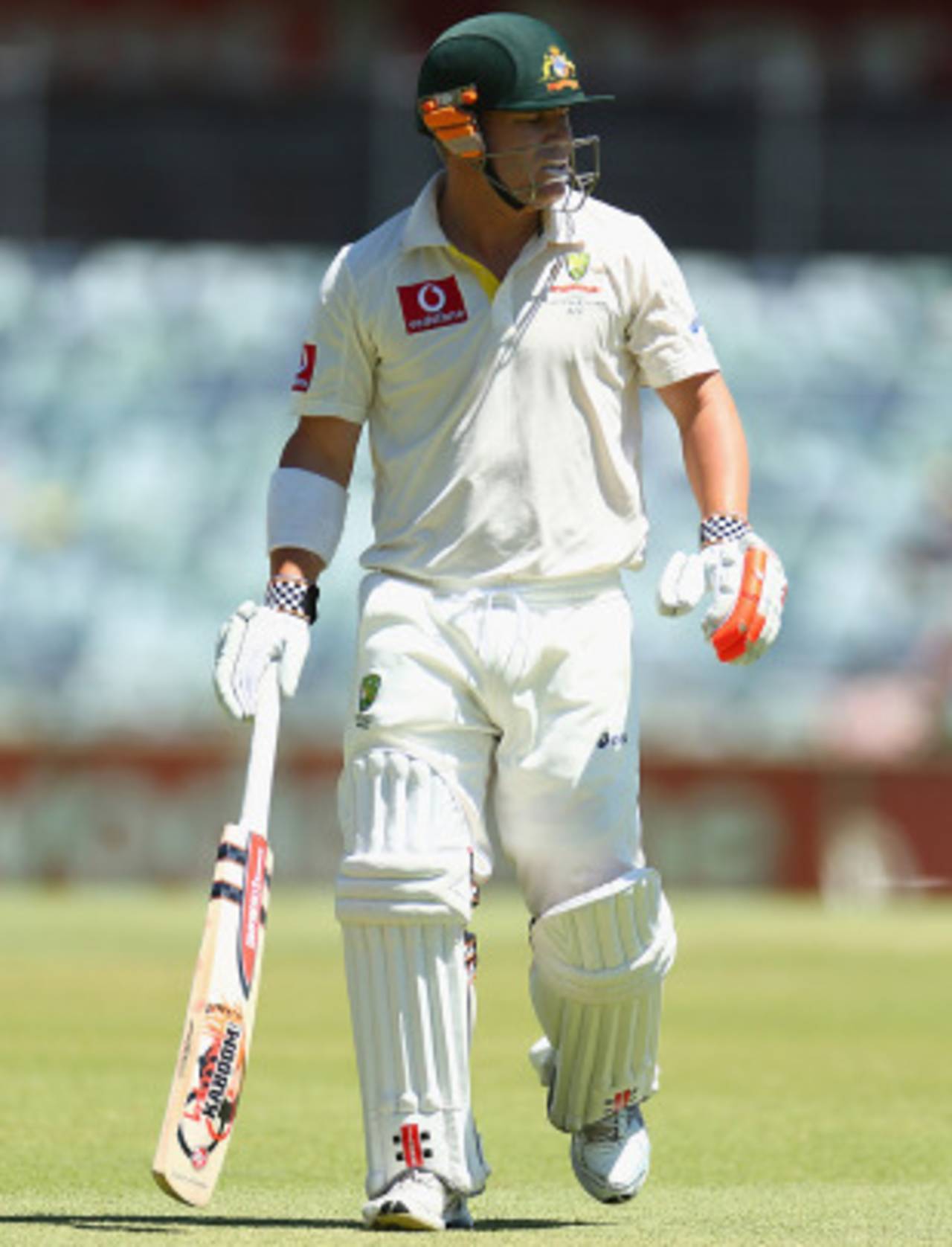Slater's cautionary tale for Warner
David Warner can take a lesson from Michael Slater as he aims to find the balance between aggression and care at the top of the order
Daniel Brettig in Hobart
13-Dec-2012

In Perth, David Warner was out to a heedless stroke in the first innings • Getty Images
In October 1996, Mark Taylor and Michael Slater walked to the middle of the Feroz Shah Kotla in Delhi for the second innings of a one-off Test match against India. They faced a deficit of 179. Within minutes, Slater was making his way back to the ground's then rickety pavilion, having swung at a ball he could barely reach from the modest medium fast of David Johnson and been acrobatically held at slip by Mohammad Azharuddin.
That heedless stroke hastened the tourists' heavy defeat, cost Slater his Test place - he would not return until 1998 - and remains one of the great cautionary tales for imprudent opening batsmen. At the time, Slater was averaging 48 in Tests, and was only three matches removed from his highest score, 219 against Sri Lanka in Perth. Whether the "lesson" of his dumping was ever truly learned remains a matter for debate, and there was to be collateral damage. Without his regular opening partner, Taylor would slide into the slump that very nearly cost him the captaincy.
Australia's captain Michael Clarke had Slater's poster on his wall back then, and his admiration for the former opening batsman's derring-do shone through again in his defence of David Warner. In Perth against South Africa, Warner was out to a stroke almost as inappropriate to the match scenario as Slater, an angled bat swish at Dale Steyn's first ball of the second morning the catalyst for Australia's tumble from a strong first-day position to a fourth-day defeat. While Slater paid dearly for his error, Clarke has avoided criticising Warner for his indiscretion, reasoning that hesitance is an even greater enemy of the left-hander than impulsiveness.
"The one thing we need to understand with Davey is the same ball he got out on in Perth, we're all standing and clapping in Adelaide when it went over cover or went over slips for four," Clarke said. "That's the way he plays. The only thing I continue to say to Davey is make sure you've got that good intent, and by that good intent I mean more in his mind than the actual shot. Because when Davey's intent's right, his defence is better, his attacking shots are better. He plays his best when he's looking to score runs, there's no doubt about it.
"Yes we all have to work on shot selection at certain times in your innings, but I think Davey for the start of his Test career, three hundreds he's scored now, he's doing pretty well. Like all of us, we'd love to be more consistent and score runs every time we walk out to bat. Sometimes he doesn't look great when he gets out, but the other side is he's got that x-factor. He can take a game away from any team in the first session of a Test match really. Not too many players in the world have that talent. At the moment I'm really happy with how he's going, he was disappointed with the way he got out. But more than 'don't play the shot', it's about working in the nets to execute that shot better."
Warner's development has become all the more critical now that Ricky Ponting has exited Australia's dressing room. He is an aggressor on the field and a livewire off it, striving to be liked by team-mates even as his motor-mouth and customary brio have preceded him. In the middle, Warner is known to be a far more nervous character than he lets on, muttering incessantly about his technique and the opposition in between deliveries. He seems at his surest when in the act of hitting the ball, something he does with startling power, if imperfect judgement.
When Clarke was presented with the view that no batsman can be at liberty to play the same strokes on the pacy WACA ground as he had been on the more docile Adelaide surface, he cited a meritorious century against New Zealand at Bellerive a year ago to outline the balance of aggression and thoughtfulness he expected from Warner's batting.
"That's what you learn as a young player don't you," Clarke said. "The conditions in Perth are different to Adelaide, and what we're going to see here. I think one of Davey's greatest innings was the hundred we saw here in really tough batting conditions, but he still had that great intent. On a wicket that was doing a lot he was looking to score runs, but his shot selection was spot on and perfect that innings. In a perfect world you'd love to bottle that and say play like that every time, but there's got to be a bit of give and take with Davey."
So long as Clarke is captain and selector, there is likely to be more give than take for Warner, as his destructive potential and natural spark are highly valued. But he would not want to charge too hard, too early at the likes of Nuwan Kulasekara in this series, lest he find himself emulating Slater's harsh lesson.
Daniel Brettig is an assistant editor at ESPNcricinfo. He tweets here